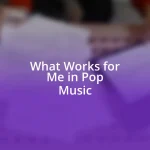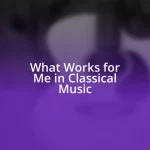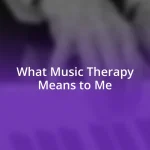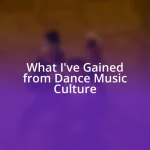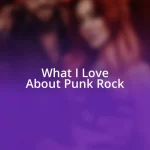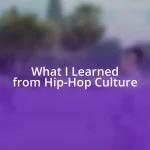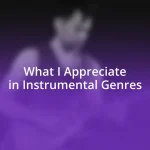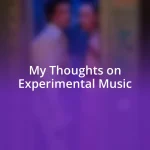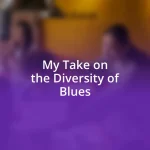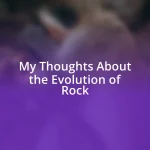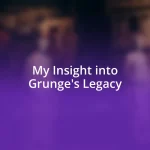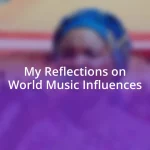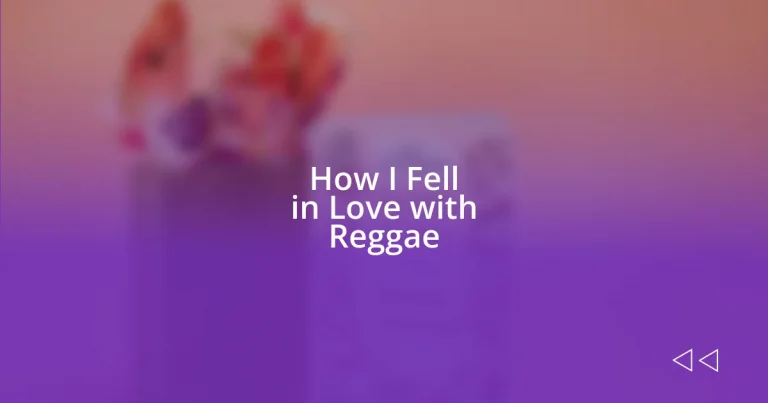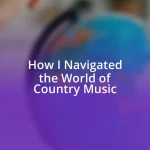Key takeaways:
- The author’s first encounter with reggae at a café sparked a deep emotional connection and curiosity about the genre’s cultural and historical background.
- Reggae music, characterized by themes of love, resistance, and unity, reflects the socio-political struggles of the Jamaican people while evolving through various influences over the decades.
- Through personal experiences and community interactions, reggae has transformed the author’s perspective on life, fostering a sense of belonging and empathy within diverse groups.
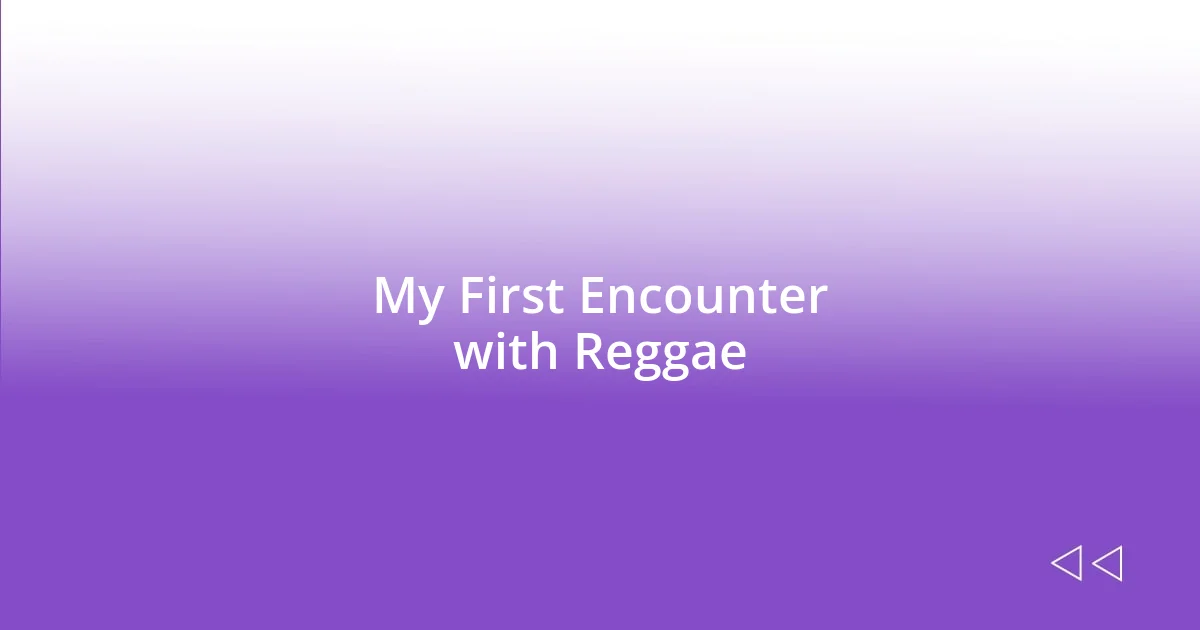
My First Encounter with Reggae
I still vividly remember my first encounter with reggae music—it happened during a hot summer day when I stumbled upon a small café that played old vinyl records. As soon as the distinct sound of Bob Marley’s “Three Little Birds” filled the air, I felt an emotional connection that was both soothing and uplifting. Have you ever experienced that moment when a song just resonates with you?
I can still picture myself sitting on a rickety wooden chair, the sun casting its warm glow through the window, while the rhythmic beats lulled my worries away. It wasn’t just the music; it was the atmosphere and the sense of community. I looked around and saw smiles exchanged among strangers, united by the same captivating sound. Don’t you think music has a magical way of bringing people together in unexpected ways?
As the day turned to dusk, that initial spark ignited a deep curiosity within me. I found myself wanting to know more about the culture behind reggae, the stories woven into its lyrics, and the struggles that shaped it. Why did this genre pull at my heartstrings? I was eager to dive deeper into the vibrant world of reggae, setting the stage for a lifelong passion.

Discovering Reggae Music’s Origins
The rich origins of reggae music can be traced back to Jamaica in the late 1960s, blending elements of ska, rocksteady, and traditional African rhythms. I remember learning about how reggae emerged from the struggles of the Jamaican people, a powerful reflection of their resilience and creativity. Seeing how these cultural elements intertwined helped me appreciate the genre’s depth—it wasn’t just music; it was a voice for the voiceless.
- Reggae originated in Jamaica during the late 1960s, influenced by ska and rocksteady.
- The genre is rooted in the socio-political struggles of the Jamaican people.
- Bob Marley became an international ambassador for reggae, spreading its themes of love and resistance.
- Reggae’s unique rhythm and offbeat guitar strumming define its sound, creating an instantly recognizable beat.
- Lyrics often address themes like social justice, love, and spirituality, giving it a profound message.
Each of these facts resonated with me, as they added layers to the music I had initially just stumbled upon. I found myself diving deep into the stories and historical context, sparking an even greater love for the genre. I could feel the unity it inspired, bridging gaps between cultures and experiences, reminding us all of our shared humanity.
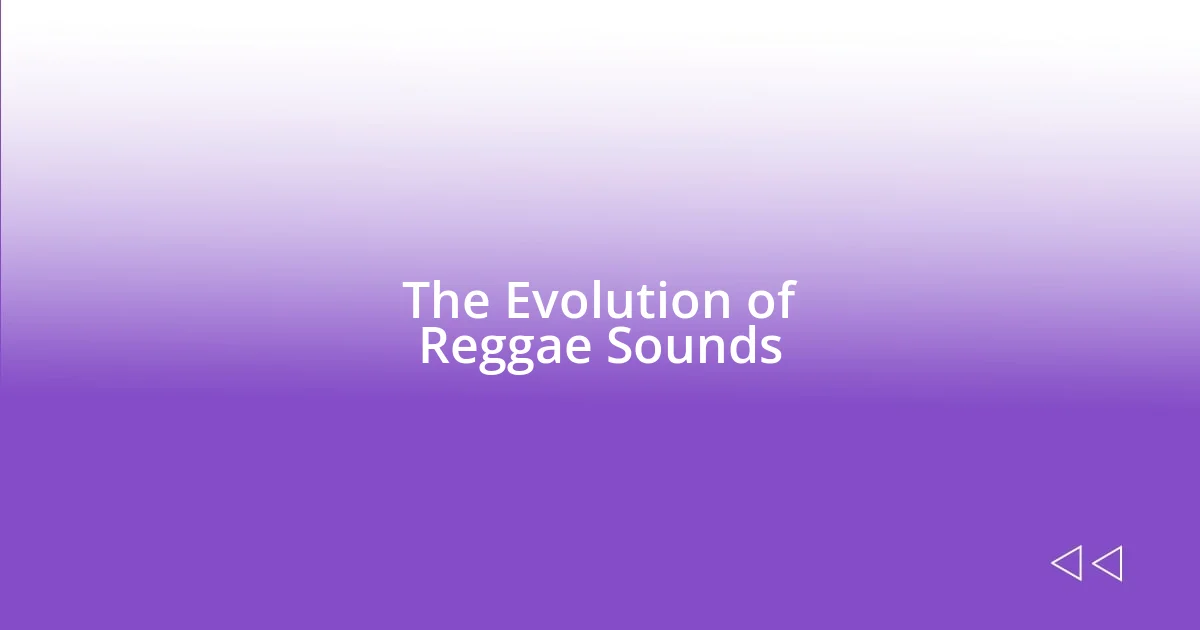
The Evolution of Reggae Sounds
The evolution of reggae sounds is fascinating because it reflects not just musical progression but also cultural shifts. As I explored reggae further, I discovered how artists have continuously adapted the genre, infusing it with influences from jazz, funk, and even hip-hop. For instance, when I first heard the fusion of reggae with dub music—characterized by heavy effects and remixing—it completely blew my mind. This innovative twist not only showcased the genre’s versatility but also left a deep impression on how I perceive reggae today.
Reggae isn’t static; it’s a living, breathing art form. The transition from traditional roots reggae to more contemporary forms like dancehall has been particularly striking. I remember attending a live dancehall show, immersed in the vibrant energy of the pulsing beats. The crowd’s enthusiasm made it clear that despite the changes, the spirit of reggae—unity, resistance, and love—remained intact. It’s intriguing how different generations of musicians have brought their unique flair while staying true to reggae’s core message.
Moreover, the global reach of reggae illustrates its adaptability and universal appeal. I once met a group of friends from different countries who bonded over their love for reggae music, which firmly underscored that this genre transcends borders. Each culture adds its twist, from Brazilian reggae to Japanese roots, making reggae a shared experience that transforms and evolves with each new listener. It’s remarkable how a sound born in Jamaica has created such a beautiful, cross-cultural tapestry.
| Reggae Era | Characteristics |
|---|---|
| Early Reggae (Late 1960s) | Rooted in ska and rocksteady, featuring conscious lyrics and slower tempos. |
| Dub (1970s) | Experimental remixing, heavy use of echo and reverb, with an emphasis on instrumentals. |
| Dancehall (1980s) | More upbeat and electronic sounds, often focusing on personal and party themes. |
| Modern Reggae (2000s onwards) | Incorporates global influences like hip-hop and pop, while maintaining reggae’s core themes of love and unity. |
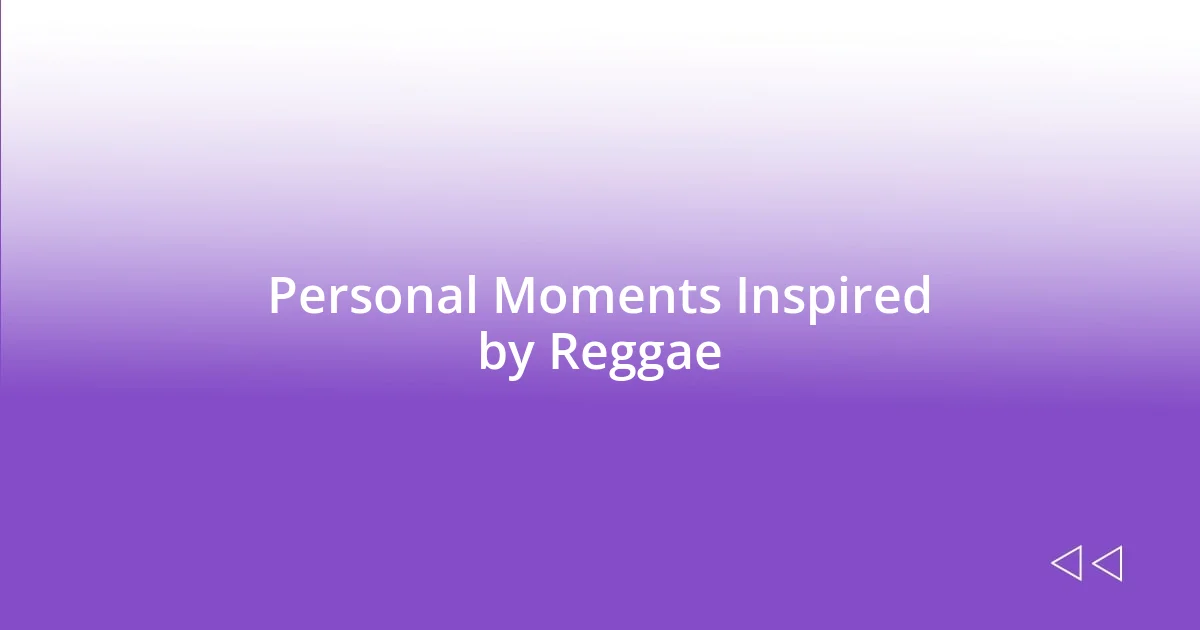
Personal Moments Inspired by Reggae
There’s something truly magical about the first time you hear a reggae song that really resonates with your soul. I’ll never forget dancing on the beach during sunset while a local band played “Three Little Birds” by Bob Marley. That moment felt like pure joy; the rhythm of the waves synced perfectly with the uplifting beat, and it made me realize how reggae has this unique ability to uplift spirits no matter the situation.
I also remember a rainy day when I was feeling particularly down. I put on Peter Tosh’s “Equal Rights” and found myself not just listening but really engaging with the lyrics. They struck a chord deep within me, addressing themes of social justice and resilience that mirrored my own frustrations. In that moment, it was as if the music wrapped around me like a warm blanket, providing comfort and empowering me to push through my challenges with renewed determination.
It’s intriguing to think about how music can create connections, like that time I visited a small reggae festival. I met folks from different backgrounds, all united under the beats of reggae. We shared our stories and danced together, and I couldn’t help but wonder: how often does a sound from one place unite so many people? It dawned on me that reggae isn’t just music; it’s a powerful force for community and understanding, reminding us of our shared humanity.
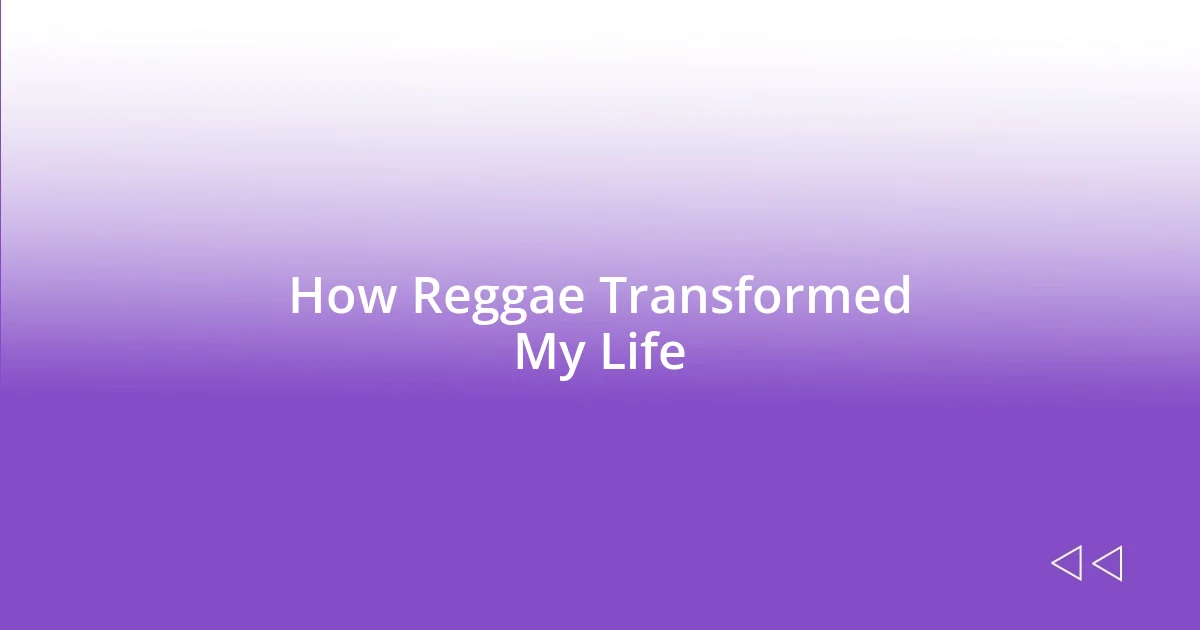
How Reggae Transformed My Life
The transformative power of reggae hit me when I started exploring the stories behind the music. One vivid memory comes to mind: I was on a long road trip, and I decided to create a playlist filled with classic reggae tracks. As the sun set and the mountains glowed in shades of orange and pink, the emotional weight of the lyrics washed over me. Songs like “Redemption Song” made me reflect on my own life struggles and aspirations, filling me with a sense of hope and resilience I hadn’t felt before.
Another turning point was during a local community event. I saw children of various backgrounds dancing and singing along to reggae songs that celebrated peace and love. This experience ignited a spark in me; it was a powerful reminder that reggae carries profound messages about unity. It made me wonder—how could a simple sound evoke such warmth and connection across so many people? That realization deepened my appreciation for reggae, showing me that it isn’t merely music; it’s a way of life that encourages empathy and understanding.
Reggae has provided me with a lens through which I see the world differently. I can think back to quiet moments at home, listening to Bob Marley while cooking dinner, feeling a sense of calm wash over me. The rhythms and melodies have become my refuge, a safe place where I can unwind and reflect. I often ask myself: what would my life look like without this genre? It’s impossible, really, to separate my journey from the beats and messages that have shaped my perspectives, making reggae a foundational part of who I am today.
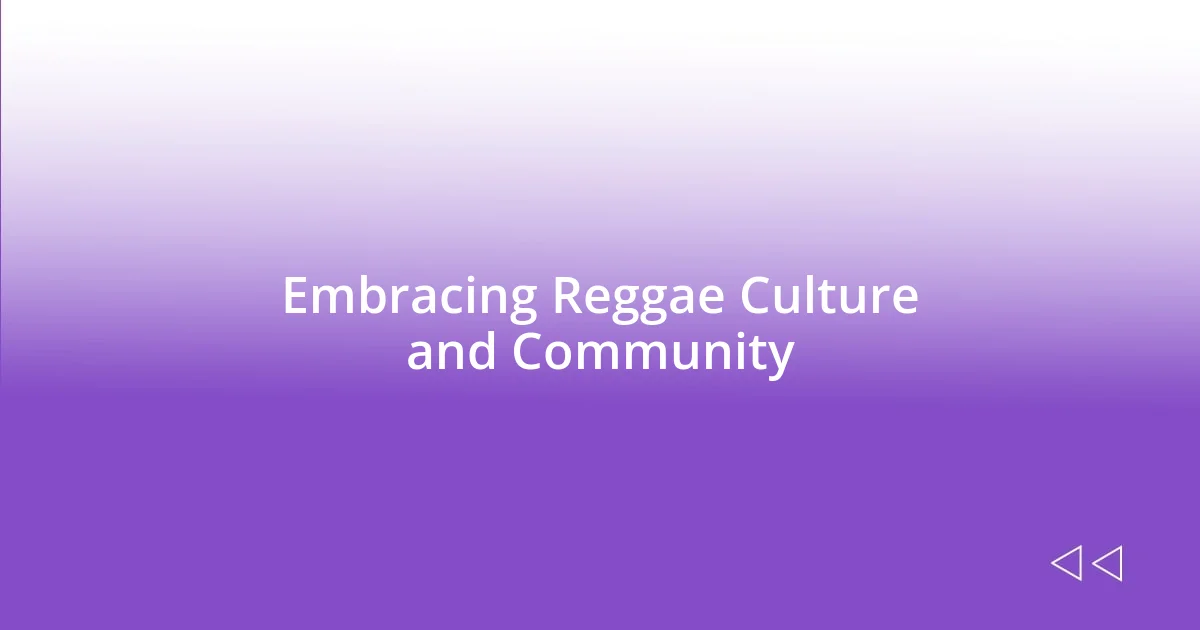
Embracing Reggae Culture and Community
Finding my place within the reggae community felt like slipping into a warm embrace. I recall attending a local drum circle where everyone was invited to bring their instruments and just play. I was nervous at first, but as the rhythms echoed around me, guidelines faded—there was just the raw joy of making music together. It was a beautiful reminder that reggae isn’t just about the songs; it’s about the connections we forge when we share our passion.
I remember the first time I attended a reggae-themed potluck. People brought dishes inspired by Caribbean heritage, and the air was filled with the aroma of jerk chicken and oxtail stew. We laughed, shared stories, and danced while classic tracks played in the background. There’s something unique about how reggae fosters a sense of belonging; it creates an environment where differences are celebrated, and everyone feels like they’re part of something larger.
These experiences have deepened my appreciation for reggae’s impact on community spirit. I often think about how the beat invites us to move—not just physically, but emotionally as well. When we lose ourselves in the music together, are we not also losing the barriers that separate us? In those moments, I feel connected to something bigger than myself, a community bound by love, awareness, and the shared rhythms of life.
